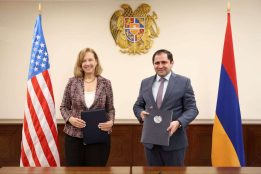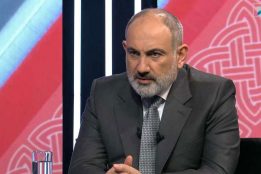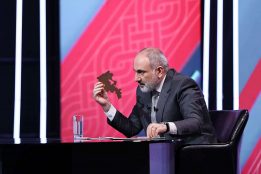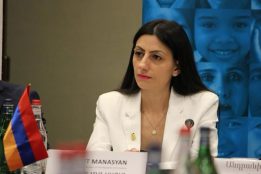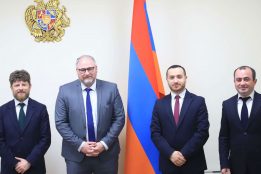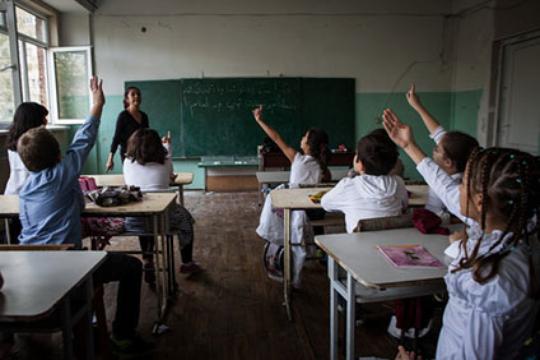
At the newly opened Cilician School in this former Soviet republic, the textbooks are in Arabic, photocopied from a single set flown out of war-torn Syria. The curriculum is Syrian, the flag on the principal’s desk is Syrian, and the teachers and students are all Syrians.
They are also ethnic Armenians, driven by Syria’s civil war to a notional motherland most barely know.
“Those who are coming here clearly want to go back,” said the school’s principal, Noura Pilibosyan, who came from Aleppo, Syria, in the summer. “Armenian is our language, but our culture is Syrian. It is hard to come here.”
Their ancestors fled the Ottoman genocide in what is now Turkey nearly a century ago and flourished in Syria, reviving one of the many minority groups that have long coexisted there.
Now, the flight of Syrian Armenians — one of many lesser-noticed ripple effects that could reshape countries well beyond Syria’s neighbors — is raising questions about the future of Syria’s diversity. And it is forcing Armenia, which depends on its strong diaspora communities to augment its otherwise scant geopolitical heft, to make delicate calculations about whether to encourage their exodus or slow it.
For now, Armenia is hedging its bets. It is sending aid to Armenians in Syria, helping them stay and survive. But it is also helping them come to Armenia, temporarily or permanently, by fast-tracking visas, residency permits and citizenship.
“Our policy is to help them the way they tell us to help them,” said Vigen Sargsyan, the chief of staff to Armenia’s president, Serzh Sargsyan.
About 6,000 Syrians have sought refuge in Armenia as fighting engulfs Aleppo, Syria’s largest city, where an estimated 80,000 of Syria’s 120,000 Armenians live. More arrive each week even as a few trickle back, unable to afford Yerevan or stay away from houses and businesses they left behind unguarded in Syria.
Ethnic Armenians are a fraction of an accelerating flood of fleeing Syrians expected to reach 700,000 by year’s end, mainly in Turkey, Jordan and Lebanon. But since the Armenians, unlike other Syrians, can easily acquire an alternative nationality, Syria could see one of its vibrant communities permanently diminished.
Syrian Armenians are known for their gold and silver craftsmanship and exquisite cuisine. They are also a critical component of Syria’s connection to Russia and the West, serving an intermediary role through their relations with the global Armenian diaspora.
Aleppo represents the last vestiges of Western Armenia, which was historically divided from what is now modern-day Armenia by Mount Ararat, a separation that through the centuries gave rise to different languages and cultures.
While Syrian Armenians have remained officially neutral in Syria’s civil war, as Christians many are wary of the rebels’ Islamist strains, and as Armenians suspicious of the rebels’ Turkish support.
The Cilician School, with 250 students, reflects the ambivalence of Syrian Armenians here: many want to return to their existence in the diaspora, even as they are welcomed in their historical homeland.
“Armenia always said, ‘Come to your home.’ They always asked us to come back,” said a man who identified himself only as Harout and was visiting a new Syrian Armenian club here in Yerevan, the capital. “Honestly, I love Armenia, but I wouldn’t leave Syria. I am praying just to go back.”
For Armenia, the Syrians’ arrival reignites a debate over how to manage its relationship with Armenians in the diaspora: encourage them to immigrate or keep them where they are, from the United States to the Middle East, generous with remittances and committed to lobbying abroad for Armenia’s interests.
Advocates of resettlement contend that Syria’s loss could ultimately be Armenia’s gain. Not only do they want to protect fellow Armenians, they want Syrian Armenians — often skilled, wealthy, educated and entrepreneurial — to help the struggling post-Soviet economy, stem high emigration and bring new ideas.
“Such diversity only enriches a nation,” said Vahe Yacoubian, a lawyer based in California who invests in Armenia and has advised the government.
So the government is easing relocation. Syrians in Armenia can use Syrian drivers’ licenses, obtain free medical care and pay local tuition at universities. Governmental and private groups help Syrian Armenians find jobs and transfer businesses to Armenia.
A vociferous minority has seized on fears of violence in Syria — and memories of the Ottoman genocide — to push for a larger nationalist goal, the return of all Armenians to the country.
“This is our land — not L.A., not New York, not Syria,” said Vartan Marashlyan, Armenia’s former deputy diaspora minister and the executive director of Repat Armenia, an organization founded in August to “actively champion” what it calls the “repatriation” of Armenians from around the world.
Syrian Armenians who yearn for Syria “want to be in the Aleppo of one year ago,” a setting whose peaceful coexistence may not return, he said. Referring to estimates of genocide deaths, he added, “We lost 1.5 million people to this mentality that it will all work out.”
But homesick Syrian Armenians find resettling hard to contemplate. They point out that nationalists like Mr. Marashlyan came to Armenia by choice, not fleeing violence.
“They want to put the label ‘repat’ on me,” said Harout Ekmanian, a Syrian Armenian journalist from Aleppo. “I am a Syrian in exile.”
Few Syrian Armenians have heeded past calls to immigrate, even after Armenia’s independence from the Soviet Union in 1991. They considered themselves Syrian, speaking Arabic and Western Armenian, not the Eastern Armenian spoken in Armenia.
Still, many contributed money and support to the fledgling state, especially during a territorial war with Azerbaijan that ended in 1994 and still simmers.
Armenia, too, needs its influential Middle East diaspora to navigate regional tensions, said Salpi Ghazarian, the director of the Civilitas Foundation in Yerevan and a former Foreign Ministry official. She said ethnic Armenians in Arab countries and Iran had helped keep the dispute between Armenia, a largely Christian country, and Azerbaijan, which is mainly Muslim, from gaining traction as a pan-Muslim issue, urging their governments not to take sides.
Tehran’s Armenian community also promotes crucial trade with neighboring Iran, she said. Armenia is landlocked, and its borders with Azerbaijan, and its ally Turkey, are closed, making Iran a lifeline. “If those communities disappear, those human relations disappear,” Ms. Ghazarian said. “Then we are left without good friends.”
Armenia has kept neutral on Syria’s uprising and has worked hard to aid people inside Syria. In recent months, three cargo planes carrying food and donations from Armenians flew from Yerevan to Aleppo, after intense negotiations with both Syria, which has severely limited external aid, and Turkey, which normally bans Armenian cargo from its airspace.
The aid was distributed in Armenian neighborhoods, but without regard to sect or ethnicity.
“We consider Syria our neighbor,” said Vahan Hovhannisyan, a Parliament member who oversaw the effort. Armenians are “grateful to Syria,” he said, because after the genocide, “Syria gave them back life.”
The government recognizes that Syria is the only home several generations of Syrian Armenians know. It approved the Cilician School’s Syrian curriculum and Western Armenian instruction. An Armenian political party covers costs; tuition is free.
“They feel like Syria is their home,” said Amalia Qocharyan, an Armenian education official. “But the reality is they have two homelands, Syria and Armenia.”
At the school, a class of seventh graders was asked who missed Syria. They answered in unison, in Arabic.
“Ana,” they said. “Me.”
Asked about life in Yerevan, they were quieter. They said they missed houses and friends; one said he could not be happy seeing pictures of fighting in Aleppo.
“In Aleppo, I used to see the Armenian flag, and I wanted to go,” said Vana, 11. “Here, when I see the Syrian flag, I just want to go home.”

















